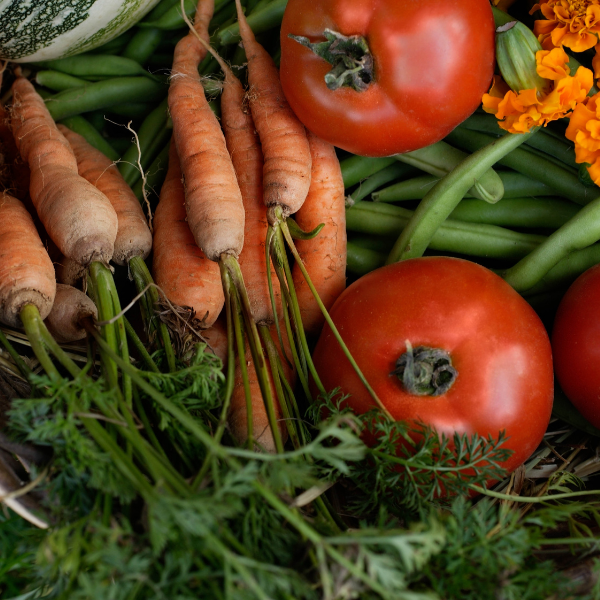Our Top 5 Fertilizer Picks for Your Vegetable Garden
•Posted on May 26 2021

Nourishing your plants from the soil up is of utmost important for growing a healthy crop.
Different minerals are necessary to support the various plants you may be growing in your garden.
Vegetables in particular have a range of nutrient needs based on their types. Root vegetables need different nutrients than leafy greens, which need different nutrients than legumes, etc.
In this article, we'll help narrow down some of the fertilizers in our collection that may help you get the most out of your veggie crop.
Read on to learn some of our favorite ones listed below.
1. Azomite
No matter what you're growing, trace minerals are never a bad idea for your plants.
Whereas macronutrients (Nitrogen, Potassium, Phosphorus) are needed in large amounts, trace minerals are needed in smaller amounts.
But just because they're needed in small amounts, doesn't mean they should be overlooked.
A deficiency in trace minerals can lead to plant conditions like:
- Yellow leaves
- Stunted growth
- Blossom end rot
- Distorted buds and leaves
- Dead spots
Trace minerals usually consist of
- Boron (B) - aids in cellular growth and helps to regulate the uptake of nutrients.
- Chlorine (CI) - required to achieve photosynthesis.
- Copper (Cu) - works to help plants metabolize nitrogen.
- Iron (Fe) - assists in the creation of chlorophyll.
- Manganese (Mn) - essential for chlorophyll production.
- Molybdenum (Mo) - helps plants metabolize nitrogen.
- Zinc (Zn) - required in seed production.
Azomite provides an abundance of trace minerals through its makeup from volcanic ash.
A consistent supply of trace minerals through Azomite powder (either micronized or ultra-fine) is sure to improve the chances of a successful harvest at the end of your growing season.
Like most meal fertilizers, kelp meal is a safe and eco-friendly fertilizer choice that is fantastic at building soil health.
Our kelp meal repackaged from OMRI certified, non-GMO kelp meal is made from a special species of giant kelp found along the Pacific coasts, Macrocystis pyrifera.
This species is unique for containing higher concentrations of nitrogen potassium than other kelps available on the market.
It's harvested from the Pacific Ocean and sun-dried until it is ready for processing.
Kelp meal is known to:
- Stimulate root development
- Boost plant growth
- Prevent fungal growth
- Release locked up minerals in the soil such as Calcium and Magnesium that would otherwise not be accessible to the plants.
For healthy, disease-free plants that grow in strong, kelp meal is a great choice!
Repackaged from OMRI certified bone meal, our bone meal supplies an ample amount of phosphorus necessary for proper root development, seed germination and blooming.
This nutrient also contains calcium, which is another essential natural mineral that helps produce strong buds and blooms while reinforcing root strength and preventing "blossom end rot" in plants like tomatoes and cucumbers.
Benefits of bone meal include:
- Pure unadulterated and natural
- Made from cows fed an organic and non-GMO diet
- Pesticide free
- Hormone free
- Inexpensive source of Calcium
- Prevents Blossom End Rot
4. Tomato Fertilizer 4-18-38 (Plus Micronutrients)
We specially formulated our tomato fertilizer to provide a balanced ratio of NPK in addition to various micronutrients.
This fertilizer offers chelated forms of Iron EDTA, Zinc EDTA, Manganese EDTA, and Copper EDTA along with Sulfur, Boron, and Sodium Molybdate.
While plenty of customers love this fertilizer for their tomato crop, it can also be used as a general fertilizer or on the following plants:
- Eggplants
- Potatoes
- Tomatillo
- Goji Berries
- Tobacco
- Peppers
- Chayote
- Nipplefruit
- Cucamelons
5. Monopotassium Phosphate 0-52-34
Because of its high potassium and phosphorus content, monopotassium phosphate (MKP) is a great addition to any fertilizer regimen where root vegetables or blooming plants are involved.
Potassium and phosphorus are key when it comes to healthy root development. Any shortage of these can lead to insufficient root growth resulting in poor nutrient and water transport throughout your plant.
This high phosphorus and potassium content of our MKP is also why we recommend it for when your plants reach their blooming stages. Abundant, healthy blooms means higher quality veggies are produced.
Grow With Greenway
Having a spectacular vegetable garden, whether you're a beginner gardener or an expert is not out of the realm of possibility if you choose to incorporate any of the above fertilizers to your plant care routine.
Shop these fertilizers and more by browsing the selection below.
Related Posts:
- How to Improve Soil Health With Soil Amendments
- Major Elements vs. Trace Elements: Why Your Plants Need Both
- 6 Frost Tolerant Vegetables You'll Want in Your Garden
Comments
0 Comments
Leave a Comment